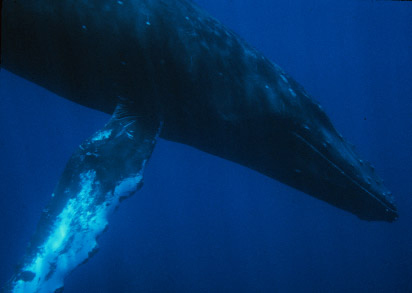
[ Lay Language Paper Index | Press Room ]
Eduardo Mercado III, emiii@buffalo.edu
University of Buffalo,
State University of New York.
Buffalo, NY 14260
Popular Version of Paper 2pAB10, “Why humpback whales learn songs: Courting or ranging?”
Presented 4:25 p.m., Wednesday afternoon, November 28, 2007
154th ASA Meeting, New Orleans, LA
Humpback whales are the only mammals other than humans that continuously modify the sounds they make as adults. They appear to do this by listening to each other and copying patterns that they hear other humpback whales producing. The traditional explanation for why whales do this is that male whales are singing to seduce female whales, and that females get really turned on by songs that are currently in style. I will suggest that, instead, humpback whales copy other whales' songs because this enables them to more clearly observe what is happening around them. They don’t copy songs to better attract females, they copy songs to more easily find other whales.

When whales sing they are often alone. This has led many scientists to believe that whales songs are an invitation to other whales within audible range. Consistent with this idea, silent whales do occasionally join singers. However, most of the whales that join singers are other males rather than females.
On the other hand, singers do occasionally sing while accompanying a single female (usually a mother with a calf). This has led some researchers to suggest that whales are serenading females to get them in the mood. In this scenario, females judge a suitor based on the properties of his song, sort of like an ocean-wide American Idol. A song that does not follow the most recent trends might be viewed as passé by females, so singers would need to keep current to compete.
These explanations seem plausible, but leave many questions unanswered. If songs change every year, then how do females decide which songs are the best? If males, hear several different songs, how do they judge whether the songs they hear are better or worse than their own? If singers are all trying to conform, why do they end up changing their songs over time so that they are singing new songs each year? More fundamentally, how do we know that whales are learning songs to please other whales?
There is, in fact, no evidence that listening whales like whale songs. On the contrary, whales are more likely to swim away when they hear a recording of a song than to approach the speaker. Singers are clearly motivated to sing because they do so continuously for many hours, even when no other whales are in the vicinity. My proposal is that humpback whales sing because this helps them to observe other whales, and that they adjust their songs to match those of their neighbors for this same reason.
How might this work? Humpback whales can detect other whales over distances of a kilometer or more. They cannot see, smell, or touch this far, so they must rely on sound to determine when other whales are in the area, and to keep track of what those other whales are doing. Singers undoubtedly can benefit from knowing the locations and movements of other whales. Simply knowing that there are three whales swimming in the ocean is not very useful if you do not know where the whales are. Singers have to figure out where other whales are by listening. In the complex underwater habitats where humpback whales live, this can be quite a challenging problem.
Singers can improve their ability to localize a sound by knowing what the sound was like before it was distorted by traveling through the ocean. By analogy, a baseball player’s knowledge about the size of a baseball can help him to judge when and where a flyball will land. By imitating the sounds of other singers, a whale can create a copy of what the sounds he hears are like at the source. The singer can then potentially compare incoming sounds to memories of undistorted copies of those sounds, and use the differences to judge the distance the sound has traveled. This is the same basic process that bats, dolphins, and sonar operators use when they compare echoes to the signals that generated those echoes to locate and track targets.
From this perspective, singing whales do not learn songs to seduce, they learn songs to enhance their auditory perception of space so that they can better assess where whales are and what they are doing.
[ Lay Language Paper Index | Press Room ]